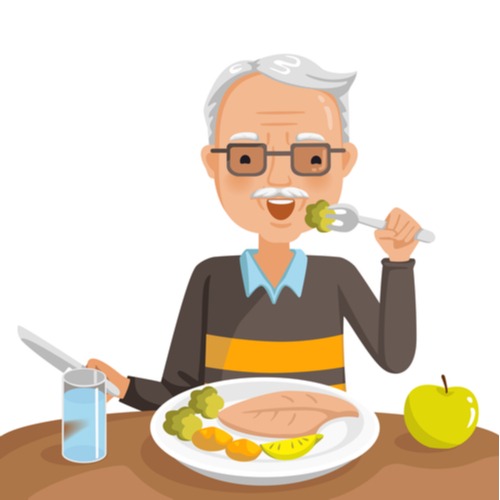How Much of a Challenge is Eating with Dentures?

A question we’re often asked by first-time denture wearers and those looking at getting dentures is, “How much of a challenge is eating with dentures?”
That’s a perfectly reasonable question to ask.
After all, food is one of the great pleasures in life for so many of us.
Let’s take a look at what some of the challenges are when it comes to eating with dentures, what it’s like to eat with dentures at first, how long it takes to adjust to dentures and what steps you can take to ease the process.
So You’re About to Get Dentures: What’s It Going to Be Like?
 The prospect of getting dentures isn’t one that’s often taken lightly.
The prospect of getting dentures isn’t one that’s often taken lightly.
And with good reason.
You’ve probably had fillings, braces or other dental appliances along the way. Remember how it felt at first? The awkwardness, the clumsiness, the unusual sensation?
Wearing dentures, as you can imagine, is going to take some getting used to. Speaking, sleeping and even breathing could seem foreign at first.
But what about eating?
Well, we’re committed to honesty and transparency with our patients here at Ottawa South Denture Clinic. That’s why we want you to know that, once you get your new dentures for the first time, you’re likely going to find that eating is perhaps your biggest challenge.
Full Mouth Feeling
 It’s true, many who receive dentures for the first time describe a “full mouth” feeling. The sensation is that there is this large, foreign object that’s now in a very personal space.
It’s true, many who receive dentures for the first time describe a “full mouth” feeling. The sensation is that there is this large, foreign object that’s now in a very personal space.
- The dentures might feel like they’re pushing your lips forward
- Wearing dentures at first could give a “gag” feeling
- You might find yourself biting your cheek and/or tongue
- Your tongue could feel odd with an upper denture, as it is no longer pressing against the palate and the lower denture may reduce the amount of space available for your tongue
You can imagine that any of these feelings could be magnified when it comes to eating. It might lessen your appetite, with these new sensations causing you to be reluctant to eat or concerned about what it might be like.
The ‘new denture feeling’ goes away over time. After a period of adjustment, you’ll regain your appetite, you’ll feel more comfortable eating with your dentures, and you’ll begin to take pleasure in eating once again.
Until then, here are some strategies you can start off with eating, gradually re-introducing food over time.
Strategies to Eat Better with Dentures

Like virtually anything else in life, eating with dentures can be well accomplished with a good plan and a positive attitude.
You’ve got this!
We recommend the following:
- Start out by eating small quantities of food, a little bit at a time
- Soft foods are excellent to start with (pudding, Jell-O, yogurt, eggs, pureed vegetables, etc.)
- Cut your food into smaller pieces (when moving up to fish, chicken and other meat)
- To even out the pressure on your dentures, don’t chew all the food on one side
- Chew with half the food on the back-left side of your mouth
- And, at the same time, the other half on the back-right side
- Avoid sticky foods and foods that would require excessive chewing force
Over time you’ll find what works for you. You’ll begin to develop confidence in eating with dentures.
Don’t Despair, You’ll Get Used to Eating with Your Dentures
The good news is that millions of people before you have had dentures and grown accustomed to eating with dentures.
Even better news: As denture technology improves, the fit and feel of dentures has gotten markedly better over the years.
And maybe the best news of all: Many denture wearers have reported that, over time, they have been able to get accustomed to their dentures and re-introduce many, most or even all of the foods they enjoyed before getting dentures.
For more questions on getting dentures, feel free to reach out to us. And stay tuned for more denture advice on the Ottawa South Denture Clinic blog.





